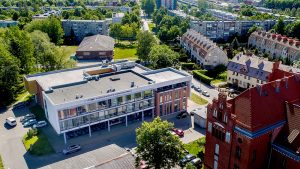
Duration:
36 months 2023/01/01 – 2025/12/31
Project total eligible budget:
2,955,553 EUR
Partner budget:
333.524,80 EUR (ERDFco-financing 266.819,84 EUR)
Interreg Baltijos jūros regiono programa 2021-2027
TETRAS
Project summary. In the project TETRAS (Technology transfer for thriving recirculating aquaculture systems in the Baltic Sea Region), public authorities trigger fish and shrimp farming on land, which reuses water from industries related to energy production and geothermal resources.
TETRAS aims to improve the economic and environmental sustainability of RAS by demonstrating how these systems can be placed strategically or combined with industrial processes to increase resource use efficiency while producing affordable and healthy food.
One process’s waste or residual is another process’s resource.
The TETRAS project addresses a challenge common to regions across the Baltic Sea Region: how to harmonise economic development with social and environmetal goals. Much of the excess water or energy used in industry is lost to the environment. What if we could capture these resources and use them for food production? Specifically, how can we use water in a smart way that balances the needs of industry with state-of-the-art food production systems? The solution is RAS: Recirculating Aquaculture Systems. On its own, RAS are expensive and energy-intensive. However, as industrial “add-ons”, RAS can be highly efficient methods of food production. For example, in combination with geothermal heat exchange, water re-use (e.g. so-called “technical” water) or agri-aqua symbioses like aquaponics. Besides food, RAS creates additional revenue streams, e.g. by-products for use in cosmetics, bioplastics, fertiliser, or biogas.
TETRAS will show how RAS can be placed in strategic geographic locations, or combined with industrial processes to increase efficiency, while producing affordable, healthy food. The partnership will co-develop regional pilots and standardised tools for municipalities to assess and monitor RAS applications and match them with suitable industries. These tools will allow public authorities to integrate RAS into regional development strategies, contributing to both sustainable waters and the transition to a circular economy in a win-win scenario.
Klaipėda science and technology park

Vilhelmo Berbomo g. 10, LT-92221 Klaipėda
Klaipėda university business incubator

Universiteto al. 19, LT-92294 Klaipėda
Marine Business Center

Pilies g. 8, LT-91234, Klaipėda
Subscribe to the KMTP newsletter and get the most up-to-date information!
Klaipėda science and technology park
Vilhelmo Berbomo g. 10, LT-92221 Klaipėda
Telephone number: +370 46 310461
E-mail: info@kmtp.lt
We are members of these organizations:



© 2017 – 2023 Klaipėda science and technology park
